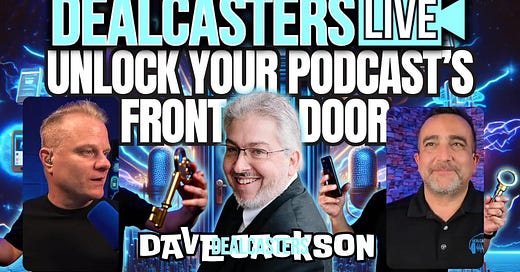On the latest Dealcasters Podcast, we were supposed to spend the entire interview with Dave Jackson talking about podcast websites - their importance, optimization techniques, and discoverability strategies. But sometimes the most valuable insights come from unplanned moments.
As livestream producers, we have a unique vantage point. While our intro video plays to notify viewers we're going live, we can see our guests in the "backstage" view that's invisible to the audience. That's when we noticed something unexpected: Dave Jackson - Hall of Fame podcaster, Head Of Podcasting at PodPage, and industry pioneer - was sitting there with his guitar, carefully listening to our theme music and trying to figure out the riff.
This moment instantly changed the interview plan. Despite all our prepared questions about digital strategy and website conversion tactics, we knew we needed to start with his passion for music. When we went live and I asked about his guitar playing, Dave lit up completely. He shared stories of playing since childhood, performing at pajama parties as a teenager, and being nicknamed "Reverend Jackson" in bands because he was the only member without a DUI.
What emerged from this detour wasn't just charming background about Dave's musical journey - it revealed a profound insight about what separates successful podcasters from struggling ones. As he explained the parallels between learning guitar and developing a podcast, a concept he called "woodshedding" emerged that would transform how I think about content creation forever.
What Guitarists Know That Podcasters Need to Learn
When Dave shared his journey from playing guitar at age 14 to becoming a podcasting pioneer, he revealed a fundamental disconnect in how creators approach different mediums.
"When you're a musician, you spend a lot of time in the basement," Dave explained. "I think the last band, it took us like four months to learn 40 songs. It's not like I learned the chord C and went, 'Okay, who's going to pay me money to play C?'"
This seemingly simple observation illuminates a critical flaw in how most podcasters approach their craft. Musicians inherently understand that preparation precedes performance. They practice scales, learn songs, develop technique, and rehearse endlessly before ever stepping on stage or asking for compensation.
Yet in podcasting, the prevailing wisdom often becomes "just start" without the equivalent preparation phase.
The Rush to Launch Syndrome
Dave continued, "I always hear people say 'Yeah, I'm getting feedback now.' And I respond, 'Okay, but didn't you say you've already launched?' And they're like, 'Yeah.' And I ask, 'Shouldn't you have gotten the feedback before you launched?'"
This rush to launch creates several problems:
1. First impressions are squandered. Your earliest episodes - often your weakest - become many listeners' introduction to your show. But - is anyone really listening?
2. Learning happens publicly. Rather than refining your voice, format, and technical skills privately, your growth process becomes your public product.
3. Strategic foundations are a total afterthought. Critical elements like audience definition, content strategy, and distribution channels are figured out on the fly rather than thoughtfully established.
4. Digital frameworks get neglected. Website, email capture, audience survey mechanisms - the tools that convert listeners to community members—become afterthoughts rather than core components.
Digital Ownership: The Ultimate "Woodshedding" Failure
Perhaps nowhere is this lack of preparation more evident than in digital strategy. When Dave shared that he was once locked out of his own Facebook group for over a month, it perfectly illustrated why building on platforms you don't control (we call it “rented land”) is fundamentally risky without proper planning.
"I remember seeing television ads for 'build your website on Facebook. Just tell your friends to go to facebook.com/slash Chris and Jim.' Well, okay. But then I've been kicked out of my own Facebook group," Dave explained.
He went on to share the cautionary tale of mp3.com, once bigger than Facebook, where musicians built audiences only to see the platform sold and dissolved, leaving them with no way to contact their hard-earned fans.
The solution isn't just "get a website" - it's developing your digital home with the same care and preparation a musician gives to learning their instrument before ever stepping on stage.
The Professional's Approach to Podcast Development
Dave's insight reveals that professional podcasters approach their craft more like veteran musicians than eager amateurs. They:
1. Develop the fundamentals first. Just as guitarists practice scales, podcasters should hone their vocal delivery, interview techniques, storytelling abilities, and technical skills before launching.
2. Seek private feedback. Musicians often rehearse for friends or mentors before public performances. Similarly, podcasters should record pilot episodes for trusted advisors before publishing.
3. Build complete "sets" before performing. A band doesn't book a gig with two songs ready. Similarly, consider having several episodes completed before launch to ensure consistency.
4. Create permanent infrastructure. Musicians invest in quality instruments that last. Don’t get it twisted: this doesn’t mean $500 microphones. For podcasters, this means establishing owned channels—websites, email lists, and custom domains—rather than relying solely on third-party platforms.
5. Plan for audience conversion. Professional musicians don't just play—they sell merchandise and connect with fans. Podcasters should similarly establish paths for listener engagement before needing them. Our friend
is a master at this. Just take a peek at the Hicks New Media Storefront to see what we mean.The PodPage Philosophy: Infrastructure Before Audience
During our conversation, Dave explained how his current role at PodPage connects directly to this woodshedding concept. The platform was built to give podcasters professional infrastructure without knowing how to code or having any technical expertise—essentially shortening the preparation phase without eliminating it.
"I always kind of scratch my head because somebody will say, 'Well, I'm trying to grow my audience,' and I'll respond, 'Great. What did you learn when you did the survey?' And they go, 'What do you mean?' And I respond, 'There's a survey built into PodPage with questions from Tom Webster,'" Dave shared.
As creators, we need to stop just throwing content over the proverbial fence and expecting it to stick. The people that you have already connected with will tell you what they want more of - and less of. Tap into it.
PodPage’s integration of audience feedback mechanisms directly into website infrastructure exemplifies the professional approach: having systems in place to gather intelligence and refine your offering from day one.
Monetization: The Natural Result of Proper Preparation
Perhaps most importantly, Dave tied this preparation mindset directly to monetization potential:
"I know so many people that have been podcasting for years, and then they finally come up with an idea for a product. And you're like, 'Oh, well, you can start talking about this in your newsletter,' and they say, 'I don't have one.' And you're like, 'Oh, you should,' and they end up saying, 'Oh, yes, I should have started this three years ago.'"
The podcasters who successfully monetize aren't just those with the largest audiences - they're those who prepared the infrastructure to convert passive listeners into engaged community members and eventually customers.
Implementing Your Own "Woodshedding" Practice
For podcasters at any stage, there's value in adopting the woodshedding mindset:
- For those pre-launch: Invest time in practicing your craft, developing your format, and building infrastructure before going public.
- For established shows: Consider what elements you've neglected to "woodshed." Perhaps it's your listener survey, email strategy, or website conversion path. Does that make you squirm a bit? Good. That’s where we dig in.
- For those feeling stuck: Ask yourself if you've been avoiding the equivalent of "practice time" in favor of constantly publishing. Some focused development work might be more valuable than another rushed episode.
Beyond Technical Mastery: The Emotional Benefits of Preparation
Dave's musical metaphor extends beyond “chops.” Throughout our conversation, he highlighted how proper preparation creates confidence—the same confidence a musician feels when they've rehearsed a piece so thoroughly that they can perform it even when things go wrong.
"I found out that if you don't grimace and make a mean face at the guy who did it or whatever, nobody knows you made a mistake," Dave shared about performing music. This resilience comes from preparation, not talent—a lesson countless podcasters could benefit from.
The Patient Path to Podcasting Excellence
As we navigate the increasingly crowded podcasting landscape, perhaps the most valuable skill isn't technical prowess or marketing savvy—it's the patience to properly "woodshed" before seeking an audience.
Dave Jackson's insight reminds us that sustainable success rarely comes from shortcuts or hacks. Rather, it emerges from deliberate practice, thoughtful preparation, and building infrastructure that supports both your content and your community.
The musicians who spend months in the basement before booking their first gig often enjoy careers that span decades. The podcasters who embrace this same discipline may find their shows have similar staying power—and far greater impact—than those who rush to publish without proper preparation.
---
*The full conversation with Dave Jackson on Dealcasters explores these concepts in depth, alongside practical website strategies that transform casual listeners into engaged community members. It's a masterclass in digital ownership from someone who has helped thousands of podcasters build sustainable shows.*
*What's your approach to preparation? Are you giving your podcast the "woodshedding" time it deserves? Drop a comment below—I'd love to hear your thoughts.*













Share this post